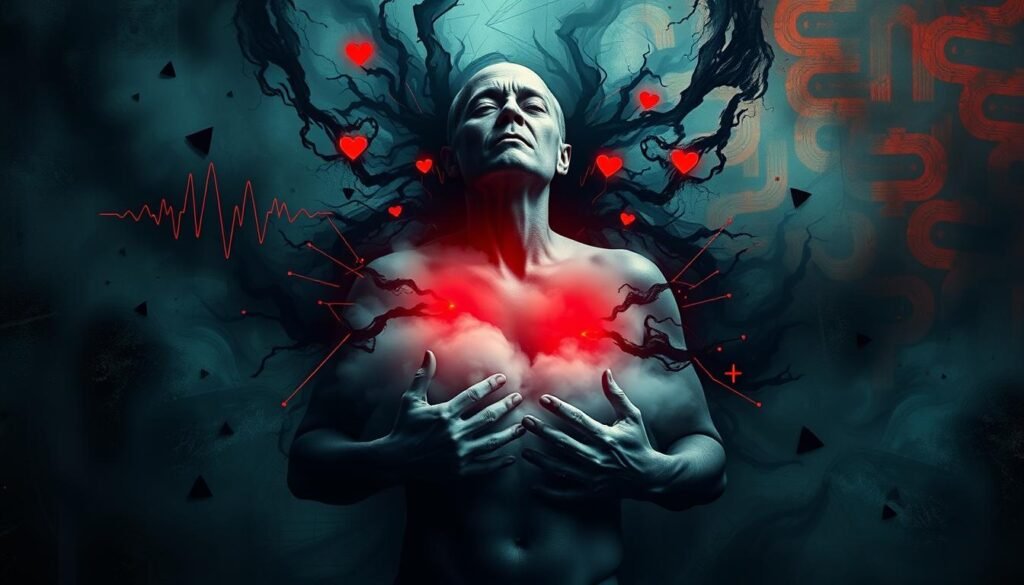Almost 5 percent of American adults will face panic disorder at some point. This shows a growing anxiety issue affecting millions. It brings up a big question: can anxiety kill you? Anxiety might not cause death directly. But, it can greatly disrupt everyday life. People often fear it’s life-threatening. With anxiety at the forefront of mental health issues, it’s key to know its risks and impact on well-being.
We’re looking closer at how anxiety affects health. This article checks out the different ways anxiety appears in someone’s life. It talks about the impact on both mental and physical health. By focusing on panic attacks, heart health, and how to manage anxiety, you’ll learn about its complex effects and potential risks.
Key Takeaways
- Nearly 19.1% of US adults are affected by anxiety disorders.
- About 5% of individuals experience panic disorder at some point.
- Most panic attacks last less than 30 minutes, usually around 10 minutes.
- Chronic anxiety is linked to a higher risk of heart disease.
- Only 36.9% of individuals with anxiety disorders receive treatment.
- Panic attacks can exacerbate feelings of anxiety and disrupt daily life.
Understanding Anxiety and Its Impact on Health
Anxiety is more than occasional worry. It involves constant and excessive stress about daily life. This emotional state can show up as different disorders. These can greatly affect a person’s mental health.
Understanding anxiety means seeing how it can go from a slight worry to serious issues. It can really impact a person’s health.
What is Anxiety?
Anxiety includes various disorders like generalized anxiety disorder, panic disorder, and social anxiety. Every type affects people differently. Some might think normal feelings are signs of major health problems because of their anxiety. This increases their stress. It’s important to know about the many sides of anxiety.
How Anxiety Affects the Body and Mind
Anxiety does more than upset the mind. It triggers the body’s fight or flight response. This causes an increase in heart rate, faster breathing, and tense muscles.
Being anxious for a long time can lead to serious health problems. This includes headaches, stomach issues, and heart disease. Anxiety can also cause insomnia and trouble focusing. This shows how it can mess with daily life.
Can Anxiety Kill You? The Facts
Anxiety disorders are more serious than many people think. They can lead to health problems, especially ones that affect the heart and come from too much stress. There’s a lot of anxiety research findings that show we need to pay more attention to anxiety’s effects on health.
Overview of Anxiety-Related Health Risks
Anxiety disorders make some health risks worse, possibly leading to an earlier death. For example, anxiety and depression make up more than half of the world’s disability issues. Anxiety can cause many health problems like:
- Cardiovascular diseases
- High blood pressure
- Diabetes
- Obesity
- Mental health disorders
Panic attacks can feel deadly but don’t actually kill. However, they do make you feel like you’re in great danger. The death rate for people with anxiety disorders is about 8.7 per 10,000 person-years. This shows how severe the fatal anxiety consequences can be.
Research Findings on Anxiety and Mortality
Many studies link anxiety disorders to a higher chance of dying early. One study looked at over 3 million people for almost 10 years. It found that 2.1% of those with anxiety died during that time. Their risk of death was 1.66 times higher than those without anxiety. People with anxiety were more likely to die from both natural and unnatural causes. Depression often made things worse, especially for unnatural causes of death.
Chronic anxiety can hurt your relationships and how well you do your job. Getting help early can lessen these effects. For tips on dealing with anxiety, check out this link.
The Connection Between Anxiety Disorders and Panic Attacks
Anxiety disorders can often lead to panic attacks. These are sudden, intense moments of fear or discomfort. It’s important to know the signs of these attacks. About 31.1% of U.S. adults will experience an anxiety disorder. Moreover, around 11% will have panic attacks at some time in their lives.
Identifying Panic Attacks
Panic attacks come with several symptoms. They bring a strong feeling of fear. Symptoms often include:
- Heart palpitations
- Shortness of breath
- Chest pain
- Dizziness or lightheadedness
- Feelings of unreality or detachment
These symptoms might seem like those of a heart attack. This can lead people to wrongly think they’re very sick. Knowing the true risks of panic attacks helps. It reduces false alarms and encourages the right kind of help.
How Panic Attacks Can Feel Life-Threatening
During a panic attack, you might feel you’re in big danger. Symptoms, like a racing heart and hard breathing, can make fear worse. This fear can make the panic continue, creating a cycle of worry and more panic attacks.
Understanding these symptoms is key to managing panic attacks. Seeking therapy or support can help. It can reduce the impact of anxiety on daily life.
| Panic Attack Symptoms | Potential Misinterpretations | Panic Attack Dangers |
|---|---|---|
| Heart palpitations | Signs of a heart attack | Increased anxiety about health |
| Shortness of breath | Asthma or other respiratory issues | Intensified fear and distress |
| Dizziness | Impending fainting or stroke | Potential avoidance of activities |
| Feelings of unreality | Signs of a mental breakdown | Increased isolation and withdrawal |
| Chest pain | Heart problems | Emergency visits and unnecessary treatments |
Symptoms of Anxiety Attacks: A Closer Look
Anxiety attacks bring an intense fear that suddenly strikes. These signs help people know when an attack hits, guiding them towards getting help. The symptoms can be both physical and mental, affecting individuals differently.
Common Symptoms of Anxiety Attacks
Anxiety attack symptoms affect both your mind and body. Key signs include:
- Rapid heart rate or tachycardia
- Trembling or shaking
- Shortness of breath
- Chest pain or discomfort
- Excessive sweating
- Feeling dizzy or lightheaded
It’s important to recognize these signs. They can make people avoid situations, making their anxiety worse.
The Physical and Mental Experiences During an Attack
Attacks come with intense mental confusion. Many fear they are losing control. They might also feel like they are hyperventilating or their chest is tight.
These feelings can mimic severe health issues, increasing the worry. The mix of physical and mental symptoms during an attack makes things very hard for those affected. Understanding these moments helps in finding ways to cope.

| Symptom | Physical Experience | Mental Experience |
|---|---|---|
| Rapid Heart Rate | Increased heart rate that may feel like racing | Fear of heart issues or panic |
| Trembling | Uncontrollable shaking or quivering | Loss of control or impending doom |
| Shortness of Breath | Inability to take deep breaths | Fear of suffocation or choking |
| Chest Pain | Discomfort in the chest area | Fear of having a heart attack |
Understanding these symptoms means we can better handle anxiety attacks. Knowing what happens can help people face their anxiety with confidence.
Anxiety and Cardiovascular Health
Anxiety plays a big role in heart health, causing serious risks. It makes the heart more prone to diseases. This is due to anxiety leading to bad habits like smoking, not eating well, and staying inactive. These habits create a strong link between anxiety and heart disease.
Chronic Anxiety’s Impact on Heart Disease
Studies show that chronic anxiety can make heart problems worse. People with anxiety have higher stress hormones. This makes their heart rate and blood pressure go up. Over time, this can lead to big heart problems. Knowing how anxiety affects the heart is key. Managing anxiety well can make the heart healthier.
Studies Linking Panic Attacks to Heart Problems
There’s a clear link between panic attacks and heart issues. Panic disorders increase the chance of these attacks. This puts a lot of stress on the heart. Panic attacks themselves don’t cause heart attacks. But, they can trigger problems in those with or without heart conditions already.
| Aspect | Details |
|---|---|
| Chronic Anxiety Effects | Elevated stress hormones, increased heart rate, higher blood pressure |
| Panic Attacks | Can worsen existing heart problems; physical stress experienced during attacks |
| Heart Disease Risk | Significant correlation between anxiety and the development of heart conditions |
| Management Importance | Effective anxiety control can lead to better cardiovascular health |
Taking care of your mental health is key for heart health. Reducing stress is very important to lower heart risks. For more information, check out this article.
Managing Anxiety: Effective Techniques
Finding ways to manage anxiety is key for those affected by this common condition. There are many techniques that can help ease anxiety symptoms. These options can improve well-being.
Anxiety Management Techniques: Breathing & Mindfulness
Using breathing exercises and mindfulness can really help with anxiety. Deep breathing helps us relax. It activates our body’s calming reflex. This helps us cope in stressful times. Doing rhythmic exercises like walking or swimming for 15 to 30 minutes a few times a week can lower anxiety levels.
Mindfulness practices like guided imagery can shift our focus. They move it from stress to calm visualizations. These methods allow us to rethink our thoughts and feelings. This shows how focusing our mind can reduce anxiety.
Cognitive Behavioral Therapy for Anxiety
Cognitive Behavioral Therapy (CBT) is very effective for treating anxiety. It’s a method backed by a lot of research. It gives people tools to change negative thoughts and behaviors linked to anxiety. CBT helps identify unhelpful thoughts, allowing for a change in perception about panic and anxiety.
This therapy builds resilience and encourages good coping skills. As people understand their anxiety better, they can choose how to respond. This leads to a more balanced, fulfilling life.

The Role of Medication in Treating Anxiety Disorders
It’s important to know about the different medicines for anxiety. These medications can help people feel better and take back control of their lives. Some common types are SSRIs and benzodiazepines, each with its own way of treating anxiety.
Types of Medications Used for Anxiety
Benzodiazepines are often used for panic and generalized anxiety disorders. They work fast, which makes them good for short-term help. SSRIs like escitalopram and fluoxetine correct chemical imbalances in the brain. Various anxiety meds exist, including buspirone for long-term care, though it may take weeks to work.
Understanding the Risks and Benefits of Medication
Taking meds for anxiety has many pros, but it’s vital to know the cons too. Long-term use of benzodiazepines can lead to dependence. Users must be cautious and follow a doctor’s advice because quitting suddenly can be dangerous. On the other hand, SSRIs and antidepressants may need up to 6 weeks to work but usually don’t cause dependency. This shows why talking to doctors about treatment plans is key.
Support Resources for Coping with Anxiety
Finding the right support can greatly help those with anxiety disorders. Getting professional help is key. Experts provide insights and strategies that truly help. Therapy and support groups help people tackle their recovery journey.
Finding Professional Help for Anxiety Disorders
Many with anxiety don’t seek help. Around 63% of people with anxiety don’t get treatment. They miss out on vital mental health resources. Professional help ranges from therapy with lots of evidence to help manage it and medication for those who need it. Knowing the value of expert advice can start healing one’s mind.
Community Support and Online Resources
Community support offers a welcoming space for those with anxiety. Local groups and online sites are key anxiety support resources. They allow people to share, learn, and get coping tips safely. Finding these groups is crucial for managing anxiety well. For more info on finding support, check out this useful guide.

| Resource Type | Description | Benefits |
|---|---|---|
| Therapy | One-on-one sessions with a mental health professional. | Customized coping strategies and personal support. |
| Support Groups | Group meetings with others facing similar challenges. | Shared experiences and emotional camaraderie. |
| Online Forums | Virtual spaces for discussion and advice. | 24/7 access and anonymity for users. |
| Self-Help Resources | Books, apps, and videos focusing on anxiety management. | Accessible strategies for daily practice. |
Using community support for anxiety creates a network that’s crucial for healing. These resources help improve symptoms and connect with others in similar situations.
Common Misconceptions about Anxiety and Mortality
Anxiety disorders come with many false beliefs. Some people think panic attacks can cause death. This fear can stop them from getting help. Knowing the truth about anxiety helps promote mental health and encourages seeking assistance.
Debunking Myths Surrounding Anxiety Disorders
There’s a myth that anxiety makes people violent. Yet, research shows only a small fraction of those with mental illness commit violent acts. This proves many fears about anxiety are based on misunderstandings.
- Myth: Panic attacks always result in hospitalization.
- Fact: While panic attacks are distressing, they usually do not result in severe health consequences.
- Myth: Individuals with anxiety disorders are dangerous.
- Fact: Many individuals with serious mental illness are less likely to commit violent acts when factors are taken into account.
The Importance of Understanding Anxiety’s Effects
It’s key to understand how anxiety affects us. Many fear it as a constant health threat. Learning about anxiety’s true impact can help us respond better and reduce mental health stigma. Studies show anxiety can cause ongoing stress, risk heart disease, and lead to depression.
| Anxiety Impact | Potential Health Outcomes |
|---|---|
| Chronic Anxiety | Increased risk of heart disease |
| Panic Disorder | Higher rates of healthcare utilization |
| Stress-Related Disorders | Contribution to obesity and diabetes |
| Generalized Anxiety Disorder | Links to depression and anxiety disorders |
Conclusion
Anxiety is a huge mental health issue in the United States. It doesn’t just cause emotional pain – it’s linked to physical problems and a higher risk of suicide too. Studies show that more than 70% of people who tried to take their own lives had an anxiety disorder. This highlights how crucial managing anxiety is for safety.
Treating anxiety is definitely possible. With options like Cognitive Behavioral Therapy and medicines, people can get better. It’s very important to know about mental health. This knowledge helps people get the support they need. With the right help, they can handle their anxiety and lower their risks.
Today, focusing on mental health is more important than ever. Support and resources from the community are key. They help people feel brave enough to seek help. When we put mental wellness first, everyone benefits. Our communities become stronger and healthier.
For more info on how anxiety affects health, check out this resource.